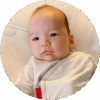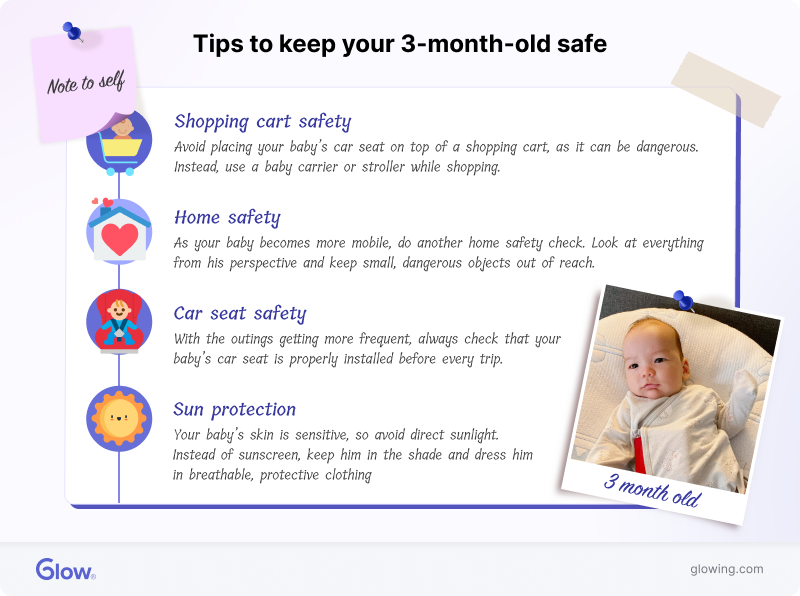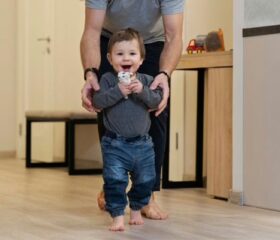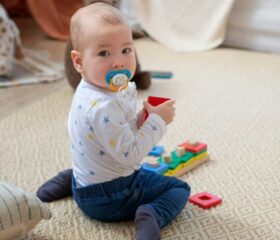Baby Month by Month
3-Month-Old Baby
Your baby may start trying to roll over from his tummy to his back.

At 3 months old, your baby is far more interactive and curious about the world around him than he used to be. Expect to see more smiles, giggles, and some pretty exciting physical developments.
Read on to find out how your baby’s growth and development are coming along, how to keep him safe, and what activities you can do with him at this stage.
Your baby’s physical development at 3 months
Your baby is past those early weeks of only sleeping, eating, and pooping. Now, he’s moving and interacting much more with the world around him.
All that tummy time you did with him is paying off, and you’ll see big improvements in his physical development at 3 months. Here’s what your baby can do now:
- Head control: By now, he has more head control. He should be able to lift his head 45–90 degrees off the ground and hold it steady when he’s in the prone position (lying on his front).
- Hand-eye coordination: Your baby may reach for objects and bat at hanging toys at this stage. He may even grasp toys and bring them to his mouth to explore them (everything goes in his mouth now!)
- Push-ups: You might catch him doing baby “push-ups” during tummy time—lifting his head and chest off the ground and using his arms for support. This helps him build his upper body strength. 1
- Leg strength: You may see lots of kicking and stretching as he puts his lower limbs to work. When you hold him upright with his feet touching a surface, he might even try to push down.
- Rolling over: Your baby might attempt to roll over from his tummy to his back around this age. According to the CDC, rolling over is often a 6-month milestone, but he might surprise you and roll over sooner. 23
Your baby is growing quickly, and he’s not stopping any time soon. In fact, he might double his birth weight by next month. 4 Consider tracking his development in a baby tracker app, and check with your pediatrician to see if your baby’s growth is on track.
Cognitive and social development
In addition to your baby’s physical development, his cognitive and social skills are also rapidly evolving.
He’s been giving social smiles and cooing at you for a few weeks already. 5 Now, you can expect even more progress:
- Babbling: Your baby is learning to “talk” more and make sounds like “ah-goo,” “muh-muh,” or “bah-bah.” These sounds are common when babies start babbling. Yours might even try to imitate the sounds and mouth shapes you make.
- Laughing: This is around the age when babies start laughing (genuinely, not just reflexively giggling). This is a major (and fun) milestone that shows he’s connecting more with you and the rest of the world around him. 1
- Awareness of people and objects: Your baby may turn toward your voice, smile when he sees you, and follow moving objects with his eyes. He can also recognize his own hands and play with them.
- Expressions of disgust: You may notice your baby makes weird expressions when he encounters something he doesn’t like, such as tasting something sour (not that he should eat anything other than breast milk or formula at 3 months) or hearing loud noises. 1
Your 3-month-old’s personality is also really starting to shine. He might be serious, silly, gregarious, determined, or a mix of all of these things!
Feeding your 3-month-old baby
If you’re breastfeeding, you might notice that your baby has gradually stretched out his feeding times. Continue to nurse on demand and look out for his hunger cues. As your baby grows older, he’ll need fewer feeding sessions each day. 6
Bottle-fed babies may eat more at each feeding and have longer stretches between feeds at 3 months. Don’t force your baby to finish a bottle if he shows signs that he’s full; you don’t want to overfeed him. 7
Is it okay to mix cereal with milk or formula?
Although some parents claim that you can add a little cereal into your baby’s bottle to help him sleep better, this isn’t safe, and you should never do it, even when he’s ready for solid food. This could put him at risk of choking, and you could mess with his nutrition intake, which will disrupt his health. 8
Can you still take prescription medication when breastfeeding?
It typically isn’t a problem for breastfeeding moms to use prescription medications. However, there are a select few you should avoid taking when you’re breastfeeding. To be on the safe side, get the green light from your doctor before you take any medication. 9
Typical sleep patterns for 3-month-olds
Right now, your baby still needs about 15 hours of sleep: around 9–10 hours at night and 4–5 hours during the day. 10
He may take more consistent daytime naps and stay quiet for longer stretches at night now. In fact, your baby may have started sleeping through the night (for about 6–8 hours) without waking up.
If he’s not able to do that yet, don’t worry; the time will come soon. About two-thirds of babies can regularly sleep through the night at 6 months old.
You can cue your baby that it’s time to sleep by establishing a consistent bedtime routine. For instance, you can cuddle him, play music, or sing him a lullaby before putting him to sleep.
Start looking into childcare providers (if you need one)
If you need childcare in the near future, start researching your options now. In addition to doing online research, a great way to find good sitters and nannies is to ask people you trust, such as other parents and your pediatrician, for suggestions.
Health issues to look out for in your 3-month-old
While your next well-baby visit is still a month away, you should call your doctor right away if you notice any concerning health issues. Look out for:
- Infant eczema: If your baby has infant eczema (or atopic dermatitis), his skin may be dry and scaly, have small bumps, and show redness, swelling, and thickening. 11 This is different from cradle cap (also common at this stage), which primarily causes a flaky scalp.
- Skin rashes: Bug bites, allergies, and viral or bacterial infections can all cause rashes. Skin rashes are usually not dangerous and will resolve on their own, but it’s still worth getting a professional’s opinion.
- Baby acne: While this condition is usually harmless, contact your pediatrician if your baby’s acne doesn’t resolve after a few months, appears after your baby gets sick or takes medication, or resembles an allergic reaction (think of an itchy rash with raised bumps).
- Ear infections: It’s common for children to get ear infections, especially when they catch a cold. 12 If your baby has a fever, keeps tugging on his ear, is fussier than usual, and has trouble sleeping, then he might have an infection. 13
- COVID-19: Babies usually get mild cases of COVID-19. Keep an eye out for symptoms like a runny nose, sneezing, or coughing.
- Unusual poop: It’s normal for breastfed babies to have looser poop and formula-fed babies to have firmer poop. If your baby has diarrhea or blood in his poop, get him to the doctor right away.
- Gross motor delays: This refers to delays in using muscles to do certain physical activities, such as sitting, standing, or walking. Some early signs of a gross motor delay at this stage include the inability to hold his head and neck steady and having stiff or floppy muscles. 14
- Asymmetrical movement: Your baby may require medical attention if he isn’t moving his arms or legs symmetrically or always prefers leaning to one side over another. This can point to physical developmental issues, such as hip dysplasia, or a neurological or muscle disorder. Either way, you need to get him checked out.
- Lack of engagement: You should also call your doctor if your baby isn’t responding to sounds or following objects with his eyes.
You don’t need to call your doctor if your baby occasionally spits up his food; that’s normal at this stage. However, if he can’t keep his meals down and isn’t gaining weight, that merits a visit.
With all of that said, even if your baby doesn’t display any of those symptoms, if something just feels “off,” trust your instincts and call your doctor. Otherwise, just make sure he’s getting enough sleep and nutrition, and take him to his regular check-ups.
When will your baby start teething?
While babies can sometimes start teething at 3 months, you probably won’t see your baby’s first tooth until he’s around 5 months to 7 months old. When he starts teething, you may see more drool than now. 15

Tips to keep your 3-month-old safe
You may notice your baby is getting more and more active recently—this is a good sign that he’s healthy and thriving. More than ever, you need to make sure he’s in a safe environment.
Take these safety measures to protect him.
- Shopping cart safety: Don’t put your baby’s car seat on top of a shopping cart. Use a baby carrier, stroller, or wagon instead when you shop with him.
- Car seat safety: You may be taking him on more trips now that he’s older. Always check if his car seat is properly installed before using it.
- Home safety: Now that your baby is more mobile and can grab things, it’s time to do another round of home safety checks. Take a look around your home from his perspective, and keep small or dangerous objects out of his reach.
- Sun safety: Keep your baby out of direct sunlight when you take him outside. Your baby’s skin is still very sensitive at this age, so it’s not a good idea to apply sunscreen yet. The best way to protect him is to keep him in the shade and dress him in breathable clothing that covers his skin. 16
Speaking of safety, check in with your pediatrician to see what shots your baby needs. Vaccinations and immunizations, such as the respiratory syncytial virus (RSV) antibody, can prevent long-term health problems. Make sure to promptly schedule whichever ones your doctor recommends. 17
Activities to do with your 3-month-old
This is an especially fun time to parent your baby. As you both explore the world together, there are a lot of fun things you can do to help his development.
Interactive play
Tummy time is still important for him to build strength and coordination. You can make these sessions more interesting by placing a toy in front of him just out of reach.
Your baby loves to imitate the sounds and movements you make, and he’ll get better at it as he grows. Make funny faces at him, like sticking out your tongue or blowing raspberries, and see if he tries to do it back.
You can also take your baby on little “expeditions” around the house and in your neighborhood. Introduce new sounds and sights, such as by letting him see leaves move, hear birds sing, and feel different textures.
Use sensory toys
Babies at this age love to play with toys that stimulate their senses. Give him toys that trill, squeak, or make music when you press or shake them.
Rattles are especially good at this age because they’re easy to grab and allow your baby to use his fingers and play with his hands.
Language development
You can help your baby improve his language skills by talking and singing to him throughout the day. For instance, when you’re doing simple things like changing his diapers or giving him a bath, you can describe what you’re doing and let him hear the rhythm and cadence of your voice.
You can also read to your baby. Pick books with bright colors and simple pictures. Use different tones of voice and be animated and silly when you read stories. Let him grab and play with the book (provided it’s baby-friendly) to exercise his muscles.
Your postpartum health at three months
Your baby’s the center of your world right now, but don’t neglect your physical and mental health.
If you constantly feel like you’re overwhelmed, irritable (i.e., experiencing postpartum rage), or constantly sad, it could be a sign of postpartum depression or baby blues. Consider reaching out to someone, whether that means a partner, your friends or relatives, or even an online support group.
Left untreated, postpartum depression can last for months or even years, so if you feel down in the dumps and the feeling just isn’t going away, it’s a good idea to talk to your doctor or therapist, too. 18
Final thoughts
At three months old, your baby is no longer a newborn. This new stage is exciting—you’re watching him develop new skills, show his personality, and interact with his surroundings.
Don’t forget to check in with yourself and pay attention to your own needs, too. Eat healthily, exercise regularly, get as much rest as you can, and enjoy all these precious moments. They won’t last forever.
Article Sources
- University of Washington. "Developmental Milestones" Retrieved July 16, 2025.
- U.S. Centers for Disease Control and Prevention. "Important Milestones: Your Baby By Six Months" Retrieved July 16, 2025.
- NeuroLogic Examination for Pediatrics. "3 Months" Retrieved July 16, 2025.
- MedlinePlus. "Normal growth and development" Retrieved July 16, 2025.
- Louisiana State University Health Sciences Center New Orleans. "Developmental Milestones" Retrieved July 16, 2025.
- WIC South Dakota. "Feeding Guide 0-5 Months" Retrieved July 16, 2025.
- Mississippi State Department of Health. "Happy Healthy Baby" Retrieved July 16, 2025.
- Minnesota Department of Health. "Infant Cereal: Topic of the Month" Retrieved July 16, 2025.
- U.S. Centers for Disease Control and Prevention. "Prescription Medication Use" Retrieved July 16, 2025.
- Stanford Medicine Children’s Health. "Infant Sleep" Retrieved July 16, 2025.
- The Children's Hospital of Philadelphia. "Atopic Dermatitis (Eczema)" Retrieved July 16, 2025.
- New York Department of Health. "Ear Infections in Children" Retrieved July 16, 2025.
- U.S. Centers for Disease Control and Prevention. "Ear Infection Basics" Retrieved July 16, 2025.
- Montana Department of Public Health and Human Services (DPHHS). "Developmental Delay" Retrieved July 16, 2025.
- The Children's Hospital of Philadelphia. "Teething" Retrieved July 16, 2025.
- U.S. Food & Drug Administration. "Should You Put Sunscreen on Infants? Not Usually" Retrieved July 16, 2025.
- U.S. Centers for Disease Control and Prevention. "RSV Immunization Guidance for Infants and Young Children" Retrieved July 16, 2025.
- MedlinePlus. "Postpartum depression" Retrieved July 16, 2025.







